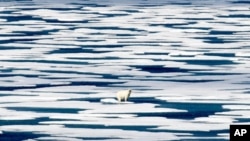The World Meteorological Organization reports 2020 is shaping up to be one of the three warmest years on record and a year in which extreme weather events have wreaked havoc on the lives and livelihoods of millions of people around the world.
The average global temperature in 2020 is set to be about 1.2 degrees Celsius above the pre-industrial level. WMO Director of Climate Maxx Dilley said that despite efforts to reduce greenhouse gas emissions in the atmosphere, temperatures are expected to continue rising.
"So what we can expect next year, we cannot say whether it will be the warmest year or not, but 2011 to 2020 was the warmest decade on record. … We now have a prediction of at least a one-in-five possibility of the temperature at least temporarily reaching 1.5 degrees between now and 2024,” he said.
That means climate change may be happening even faster than experts predicted. The 2016 Paris Agreement sought to avoid dangerous climate change by limiting average global temperature rise to 1.5 degrees Celsius until 2050.
WMO describes 2020 as another extraordinary year for the climate. It says extreme temperatures have occurred on land, sea and especially in the Arctic. It notes temperatures in the Siberian Arctic reached more than 5 degrees Celsius above average.
WMO Scientific Coordinator Omar Baddour says that is particularly serious.
“The Arctic part of the world is really suffering major changes. ... We are breaking records after records. ... The change in the Arctic is not only for the region but also for the whole global climate system … so anything changing in the Arctic affects also the weather in terms of heat waves.” Baddour said.
This year, WMO reports wildfires have consumed vast areas in Australia, Siberia, the U.S. West Coast and South America. It says particularly fierce hurricanes in the Atlantic have devastated several countries in Central America.
It reports flooding in parts of Africa and Southeast Asia have led to huge population displacement, destroyed harvests and left millions of people short of food.




